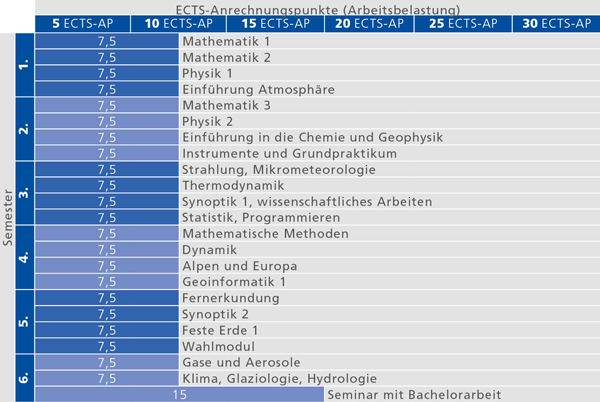Bachelorstudium Atmosphärenwissenschaften
Curriculum (2010W)
Bachelor of Science
Dauer/ECTS-AP
6 Semester/180 ECTS-AP
Studienart
Vollzeit
Unterrichtssprache
Deutsch
Voraussetzung
Matura/Äquivalentes Zeugnis und Sprachnachweis
Fakultät
Fakultät für Geo- und Atmosphärenwissenschaften
Niveau der Qualifikation
Bachelor (1. Studienzyklus)
ISCED-11: Stufe 6, EQR/NQR: Stufe 6
ISCED-F
0532 Geowissenschaften
Studienkennzahl
UC 033 604
* Informationen zum Curriculum(2010W)
Die Gesamtfassung des Curriculums spiegelt das aktuell gültige Curriculum wider, ist rechtlich unverbindlich und dient lediglich der Information. Die rechtlich verbindliche Form des Curriculums inkl. etwaiger Änderungen finden Sie in den entsprechenden Mitteilungsblättern.
Die Information, welche Curriculumsversion für Sie gilt, entnehmen Sie bitte Ihrem Studienblatt
abrufbar unter: https://lfuonline.uibk.ac.at/public/lfuonline_meinestudien.studienblatt
Spalte: Curriculum in der geltenden Fassung
- Curriculum/Gesamtfassung (ab 01.10.2016)
- Mitteilungsblatt vom 02.06.2016, 37. Stück, Nr. 441 (Änderung des Curriculums)
- Curriculum/Gesamtfassung (ab 01.10.2014)
- Mitteilungsblatt vom 13.06.2014. 27. Stück, Nr. 473 (Änderung des Curriculums)
- Curriculum/Gesamtfassung (ab 01.10.2011)
- Mitteilungsblatt vom 08.06.2011, 26. Stück, Nr. 464 (Änderung des Curriculums)
- Curriculum/Gesamtfassung (ab 01.10.2010)
- Mitteilungsblatt vom 29.09.2010, 54. Stück, Nr. 478 (Berichtigung der Verlautbarung des Curriculums)
- Mitteilungsblatt vom 21.06.2010, 30. Stück, Nr. 315
Studieneingangs- und Orientierungsphase (STEOP)
(1) Im Rahmen der Studieneingangs- und Orientierungsphase, die im ersten Semester stattfindet, sind folgende Lehrveranstaltungsprüfungen abzulegen:
- VO Einführung in die Meteorologie (PM 4 a/2 SST/4 ECTS-AP),
- VO Einführung in die Klimatologie (PM 4 b/2 SST/3,5 ECTS-AP),
- VO Physik I: Mechanik und Wärmelehre (PM 3 a/4 SST/ 6 ECTS-AP).
(2) Der positive Erfolg bei allen Prüfungen der Studieneingangs- und Orientierungsphase berechtigt zur Absolvierung der weiteren Lehrveranstaltungen und Prüfungen sowie zum Verfassen der Bachelorarbeit.
(3) Vor der vollständigen Absolvierung der Studieneingangs- und Orientierungsphase können Lehrveranstaltungen im Ausmaß von bis zu 16,5 ECTS-AP absolviert werden. Im Curriculum festgelegte Anmeldungsvoraussetzungen sind einzuhalten.
(1) Die Studieneingangs- und Orientierungsphase umfasst ein Semester (30 ECTS-AP) und hat der oder dem Studierenden einen Überblick über die wesentlichen Inhalte des Studiums und dessen weiteren Verlauf zu vermitteln und eine sachliche Entscheidungsgrundlage für die persönliche Beurteilung ihrer oder seiner Studienwahl zu schaffen.
(2) Im Rahmen der Studieneingangs- und Orientierungsphase sind folgende Lehrveranstaltungsprüfungen, die zweimal wiederholt werden dürfen, abzulegen:
- VO Einführung in die Meteorologie (PM 4 lit. a / 2 SST / 4 ECTS-AP)
- VO Einführung in die Klimatologie (PM 4 lit. b / 2 SST / 3,5 ECTS-AP)
(3) Der positive Erfolg bei den in Abs. 2 genannten Prüfungen berechtigt zur Absolvierung aller weiteren, über die Studieneingangs- und Orientierungsphase hinausgehenden Lehrveranstaltungen und Prüfungen sowie zum Verfassen der im Curriculum vorgesehenen Bachelorarbeit. Im Curriculum festgelegte Anmeldungsvoraussetzungen sind einzuhalten.
Empfohlener Studienverlauf
Der unten angeführte, exemplarische Studienverlauf gilt als Empfehlung für Vollzeitstudierende, die das Studium im Wintersemester beginnen. Die Aufstellung dient der Darstellung eines möglichen Studienablaufs und ist nicht verpflichtend. Etwaige Prüfungswiederholungen bzw. deren studienzeitverzögernde Wirkung sind nicht berücksichtigt.
Die Regelstudienzeit beträgt 6 Semester bzw. 180 ECTS-AP, wobei gemäß Universitätsgesetz die Arbeitsbelastung eines Studienjahres 1.500 (Echt-)Stunden zu betragen hat und dieser Arbeitsbelastung 60 Anrechnungspunkte zugeteilt werden (ein ECTS-Anrechnungspunkt entspricht einer Arbeitsbelastung der Studierenden von 25 Stunden).
7,5 ECTS-AP: Mathematik 1
7,5 ECTS-AP: Mathematik 2
7,5 ECTS-AP: Physik 1
7,5 ECTS-AP: Einführung Atmosphäre
7,5 ECTS-AP: Mathematik 3
7,5 ECTS-AP: Physik 2
7,5 ECTS-AP: Einführung in die Chemie und Geophysik
7,5 ECTS-AP: Instrumente und Grundpraktikum
7,5 ECTS-AP: Strahlung, Mikrometeorologie
7,5 ECTS-AP: Thermodynamik
7,5 ECTS-AP: Synoptik 1, wissenschaftliches Arbeiten
7,5 ECTS-AP: Statistik, Programmieren
7,5 ECTS-AP: Mathematische Methoden
7,5 ECTS-AP: Dynamik
7,5 ECTS-AP: Alpen und Europa
7,5 ECTS-AP: Geoinformatik 1
7,5 ECTS-AP: Fernerkundung
7,5 ECTS-AP: Synoptik 2
7,5 ECTS-AP: Feste Erde 1
7,5 ECTS-AP: Wahlmodul
7,5 ECTS-AP: Gase und Aerosole
7,5 ECTS-AP: Klima, Glaziologie, Hydrologie
15,0 ECTS-AP: Seminar mit Bachelorarbeit

Erweiterung des Studiums
Im Rahmen dieses Studiums kann das Erweiterungsstudium Informatik im Umfang von 60 ECTS-AP absolviert werden. Die Zulassung zur Erweiterung setzt die Zulassung zu einem oder den bereits erfolgten Abschluss eines ausgewählten Studiums voraus. Weitere Informationen sind abrufbar unter:
Informationen zur Prüfungsordnung inkl. Bewertung und Benotung
Prüfungsordnung
Die Prüfungsordnung ist integraler Bestandteil des Curriculums, detaillierte Informationen finden Sie unter dem Paragrafen Prüfungsordnung.
Bei der Notenverteilungsskala handelt es sich um die statistische Darstellung der Verteilung aller positiv absolvierten Prüfungen, die innerhalb eines Studiums bzw. eines Studienfaches (unter Heranziehung aller gemeldeten Studierenden eines Studiums bzw. eines Studienfaches) erfasst wurden. Die Notenverteilungsskala wird in regelmäßigen Abständen aktualisiert.
| Österreichische Notenskala | Definition | %-Satz | ||
| 1 | SEHR GUT | 23,0 | =100% | |
| 2 | GUT | 27,0 | ||
| 3 | BEFRIEDIGEND | 27,2 | ||
| 4 | GENÜGEND | 22,8 | ||
| 5 | NICHT GENÜGEND |
März 2025
Gesamtbeurteilung der Qualifikation
Nicht zutreffend
Erklärung: Eine Gesamtbeurteilung (mit Auszeichnung bestanden, bestanden, nicht bestanden) wird nur über eine studienabschließende Prüfung, die aus mehr als einem Fach besteht, vergeben (im Curriculum dieses Studiums ist diese nicht vorgesehen).
Formulare
- Nachweis über die Bachelorarbeit gemäß Curriculum
- Prüfungsprotokoll
Hinweis: Nach positiver Absolvierung der letzten Prüfung des Bachelorstudiums sind das ausgefüllte "Prüfungsprotokoll" sowie der "Nachweis über die Bachelorarbeit gemäß Curriculum" im Prüfungsreferat einzureichen. - Ansuchen um Anerkennung von PrüfungenUND Beiblatt
- Antrag um Zulassung zur dritten und vierten Wiederholung einer Lehrveranstaltungsprüfung
Kontakt und Information
Prüfungsreferat
Standort Innrain 52d
Studienbeauftragter
ao. Univ.-Prof. Mag. Dr. Georg Mayr
Studiendekanin
Priv.-Doz. Mag. Dr. Gertraud Meißl
